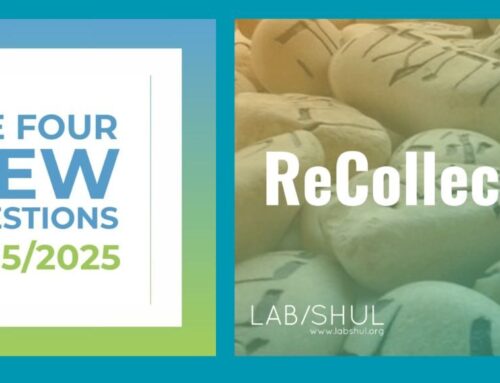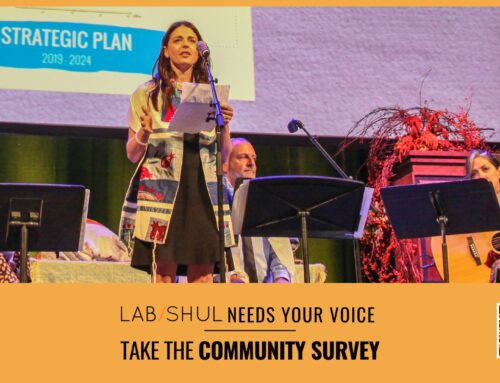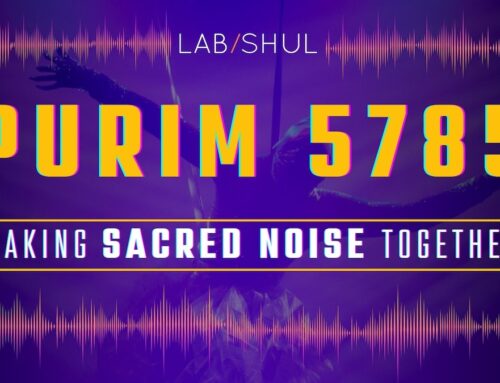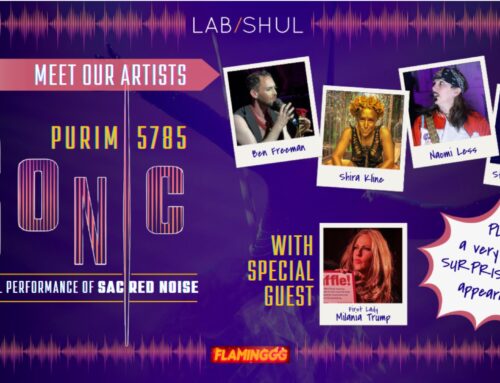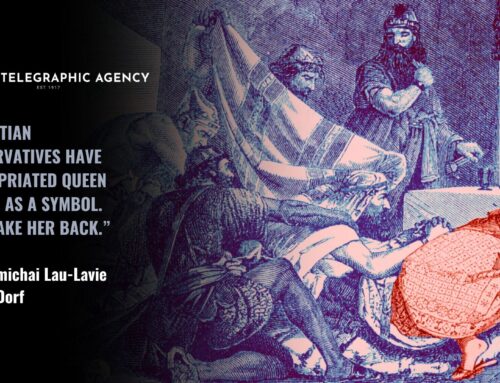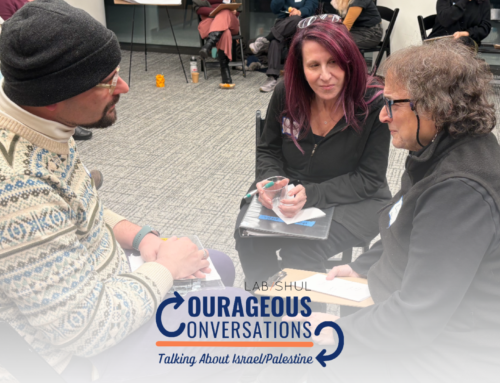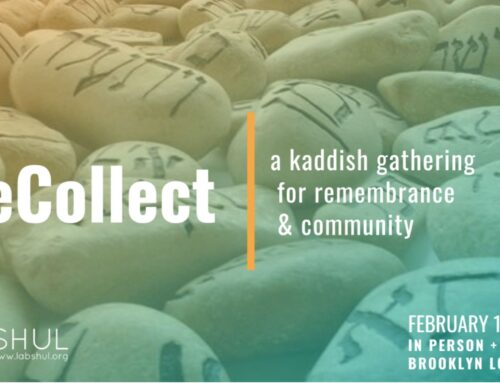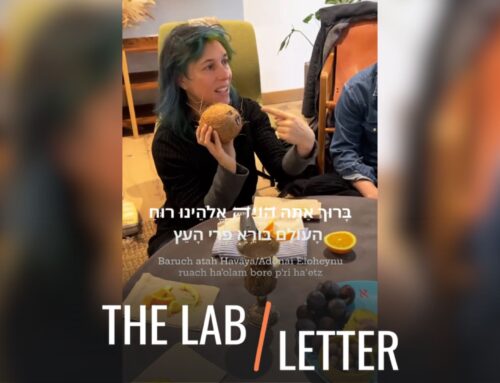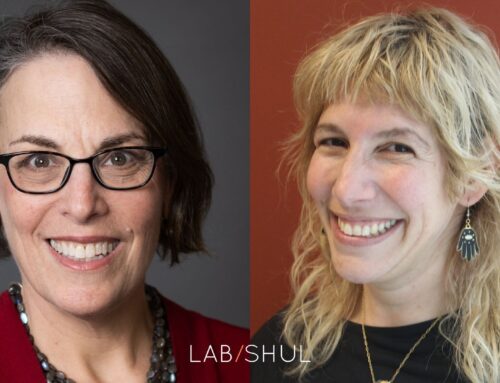10 Postcards from Israel
Dec 2023-Jan 2024
1. Post Trauma Sandwich
 On Shabbat lunch, just back again at my mother’s home in Jerusalem, my nephew’s wife, a psychologist – in charge of the kids while he’s away in uniform – turned to their 4 year old, eldest child, and asked — “What do you want on your sandwich?”
On Shabbat lunch, just back again at my mother’s home in Jerusalem, my nephew’s wife, a psychologist – in charge of the kids while he’s away in uniform – turned to their 4 year old, eldest child, and asked — “What do you want on your sandwich?”
“Post trauma!” He yells.
What?? Some giggles, surprised – we turn to look at the kid.
His mother shrugged. “I guess he heard me say those words a lot with my patients over the phone. And now he thinks that’s how you say Pastrami.”
The conversation goes on to discuss how actually there is no post – it’s all just one long trauma, and who knows whenit began and when will it end, if ever, at all. What will these children grow up with? What will the kids next door, across the border grow up with? More silences.
2. Christmas Was Cancelled
Christmas was canceled this year in Palestine. Too many people in grief over the mounting losses in Gaza and the violence in the West Bank; too sad to display public joy. John – a Christian-Palestinian friend of mine – explains to me that even Bethlehm has authorized minimized festivities, partially due to public mourning, partially because of no tourists and also because of fear of settlers and other zealous Jews who have been more violent against Christians in recent years and months. Everything moved indoors;more private and solemn. “With deaths in Gaza rising above 20,000 and with so many displaced and so much unknown, it does not feel like Christmas this year,” Jasmine -another friend from East Jerusalem – tells me. “We’re staying at home.”
On the cold Sunday night of December 24, 2023 I ventured out with another Jewish friend through the empty streets of the Old City, from church to church – no lights, no festive trees outside, a silent night but without awe, with sorrow.
The grief is palpable, enormous, the fear and fury real, the lights were off, unlike the other years when we’ve come here to wish friends a merry christmas, attend masses and stand in interfaith solidarity. The massive church doors were not open. An apologetic nun explained when we knocked gently on the side door – “by invitation only this year, sorry, very quiet, very small. Thank you for coming.”
The empty streets were like a ghost town. Literally, ghosts everywhere. No bells were ringing. No tourists. Patrolling soldiers. No other foot traffic as midnight struck. Despair.
The economic downturn will be a disaster for months and years to come.
One inflatable Santa Claus, placed by a closed souvenir shop near the Jaffa Gate, was blowing in the wind.
3. Gates of Justice Emergency Room
My stomach pains began on Christmas Day, a few days after returning to Jerusalem again; my third trip since that morning in October. I’ve been back and forth between here and there, physically and mentally, between one home and another, between my mother t/here and my kids t/here, the place where I built a life and pay my taxes and the land where I was born and raised. Like many now – who, and what, and where I am and stand – got complicated; identities tug at the seams, deep in the gut. So, it’s no wonder it got painful.
It was the kind of milder pain at first like after a normal family Shabbat with too much food around a noisy table, as if there’ll ever be again a normal family Shabbat like it used to be. Table’s set with extra empty chairs, now, and longer silences, even through the small talk and the heated debates on what is going on and what should happen. That first Shabbat back with my family, my mother holding on, my brother and his family pensive, some of the sons back from the front after two months, some not. Tender talk inside a trauma.
By early Tuesday morning my stomach pains got sharp and I took a cab to the emergency room of Shaarei Tzedek, Gates of Justice – one of the largest hospitals in Jerusalem, where my father breathed his last breath in 2014.
And so I spent 12 hours in a plastic chair, with punctured veins in both arms for tests and medicine, among an ever changing parade of impatient patients mostly trying to avoid each others’ eyes. It was a microcosm of Jerusalem, and perhaps Israeli society: Ultra Orthodox Jews, Palestinian families, Russian speaking Israelis, soldiers, with guns slung on their shoulders, Arabic, Yiddish, Russian, Hebrew, headgears of every imaginable type, and ringtones – on, loud, urgent, all day, from everybody, Arabic music or Allah hu Akbar to Israeli hits and Shma Yisrael, and some would look up from their screens to see what that sound came from, but I noticed but a few conversations between the patients. All of us inside one big too brightly lit public room of pain dealing with our personal emergencies.
The medical care was slow, but kind and efficient. Some of the doctors were Jewish-Americans, with a slight accent, One was Palestinian, in a Hijab. The nursing staff was also mixed, with more Palestinians. I noticed that Hebrew, Arabic and English were used often though the official PA system was only in Hebrew. The first doctor to examine me, with a knit kippah, seemed so exhausted. He had just returned from 60 days with a medical unit dep in Gaza. “It’s rough”, he said, “I’m glad to be back with my family.”
Half way through the day, between one blood test and another, incoming wounded soldiers from the front arrived by ambulance, and all of us in the less critical emergency situation were put on hold. A nurse yelled ‘trauma protocol’ across the room to his colleagues and so we waited. Tension spread.
We are lucky to have a hospital that we can wait in, I said to the elderly Muslim man from nearby Beit Hanina, who sat next to me at some point, fingering his beads, there with his wife and her heart troubles. Yes, he replied, and sighed deeply. We started talking then about his family in Palestine, and some in Gaza. He was quite guarded, appreciated by sympathy but didn’t want to talk about the situation. I was not surprised. It’s become increasingly difficult to show any kind of empathy with the people of Gaza, and one of the victims of this violence had become trust. “Somehow, some day”, he said, “we will survive this. But the occupation has to stop.”
Behind him, a group of Orthodox Jewish men stood in a cluster to pray the afternoon service. Throughout the day I watched people pray, whether Jewish women clutching onto books of psalms with fervent chanting, Muslim men rolling out prayer rugs in the corners of the room, soldiers putting on Tefillin in the corner booth set up by Chabad, or small groups of Jewish men crowded into afternoon minyan, a mix of patients and medical staff, getting it over quickly, ending with a collective amen.
I did my own thing, and when two young male nurses – one Jewish, one Palestinian, helped me lay down in the CT scan I closed my eyes and asked directly – just not my appendix please, no operation. I have to be back in NY in a week for an important wedding, and besides, not now. That extra level of urgency that comes with emergency situations turns prayer from abstract to specific and personal, words, old or new, just keep coming, sometimes with tears: Not this, not me, not now.
The sun was slowly setting, mid war, over a city that has known so many emergencies and wars and wounds and patients and was somehow making it through just another day, the 86th since the start of this cruel cycle. And counting.
I later learned that most Israeli hospitals and especially Emergency Rooms have already been understaffed and under budgeted for the past year, mostly as a result of this current government spending priorities and older issues that have to do with what all hospitals go through in the age of privatization. This war has made things worse because of extra need – the evacuated and wounded and added stress of so many manifesting in our heads and guts and hearts. My friend Dror, a healer, will tell me later that shame, rage and regret reside in the large intestines, the site of my infection.
By 9pm I got my results, and antibiotics. No operation.
My brother picked me up and as we drove out into the night through the electronic gates of justice, I felt grateful, lucky to be the recipient of good medical care, and simple kindness, relieved to be away from the loud neon lights, still in pain but somehow held in this immense reality of suffering with the privilege of medical care and the words that every patient in that room and everywhere holds on to like a lifeline: Somehow, someday, we will be alright.
4. Just Want to Take a Walk by Myself in the Hills
By New Year’s Eve, after a week in bed, I was feeling better but who wanted to party anyway. I got on a zoom call instead, with my friends from the Sulha Peace Project – Palestinian and Israeli peacebuilders meeting to hear updates, hold each other up, hurt and hope together.
Ahmad, in his early 20’s, lives in Al Fawar, a Palestinian refugee camp outside Hebron, in Area C. I’ve met him before with his parents and family as they drove to the Sulha Gatherings in the Dead Sea area or on the outskirts of Jerusalem. He once said to me he wants to be a doctor but that’s a big dream that they can’t afford for now.
Ahmad and his family and neighbors had not been able to leave their area by car since October 8, and the walk to the nearest town for medical or other needs is five hours by foot. With growing restrictions by the IDF and police he and his family and neighbors were running out of food. They were also running out of soul fuel to keep faith in a future, and not join the angry groups that were starting to get violent. Ahmad’s father, Amin, one of the persistent and wise leaders of the Sulha Peace Project, talked about this to the other leaders, Israelis and Palestinians in East and West Jerusalem who got together quickly to gather donations, food supplies, and organize this additional zoom call to offer their friends – and especially the young people who were getting restless and more furious by the day – a sense of solidarity, shared hope and a space for ventilation for the rage and hurt.
Kul Sana, Inta Saalem — All year, be at peace: We learned the Arabic version of Happy New Year, as we sat grim faced around screens, hearing what is happening in people’s lives in Palestine and Israel, a rare glimpse into the simple people’s pained reality.
Ahmad spoke about what it was like for him, no work, with daily tense and sometimes violent encounters with taunting settlers, some of them in IDF uniforms, the tight restrictions on movement and the growing horror of the plight of their families and friends in Gaza.
I just want to take a walk, you know? He said quietly. Take a walk on the hills, breathe the air, be alone for a minute, feel the ground beneath my feet.
But I can’t. Fences all around us.
When will we be free?
Kul Sana, Inta Saalem. Hopeful New Year.
5. Artists support Artists
 On New Year’s Day, sunny and quiet, I entered the little gift shop in Jerusalem’s Bakaa neighborhood to buy a small vase as a New Year’s gift for a friend. Their shelves included a selection of ceramic jars with colorful images of fish that caught my eye – the Hebrew sign read ‘Persian Pottery On Sale.’ I asked the woman behind the counter – “What does Persian mean? Are these from Iran?”
On New Year’s Day, sunny and quiet, I entered the little gift shop in Jerusalem’s Bakaa neighborhood to buy a small vase as a New Year’s gift for a friend. Their shelves included a selection of ceramic jars with colorful images of fish that caught my eye – the Hebrew sign read ‘Persian Pottery On Sale.’ I asked the woman behind the counter – “What does Persian mean? Are these from Iran?”
“Well yes”, she said, “imported via Turkey, and I cannot advertise that quite loudly, but those who know know, and I’m an artist and artists must support artists, politics be damned.”
They were quite lovely and I bought a few because artists support artists who support art that promotes beauty that defuses division which transcends trauma that enables us to contain multitudes and conflicting narratives, like a tiny Persian vase that will contain a single wild flower that contains the world we want to live in and live better all through this hopeful new year and more.
We found out later that the vases leaked. But still, they are pretty.
6. Clap for Ten Seconds
Tzvi, in his 40’s, stands on a stage in front of hundreds of people and asks us all to clap for ten seconds as the event is about to begin. He is my second cousin, and a newly bereaved father, standing on this stage overlooking the Old City of Jerusalem on the 30th day since their son, Ben, 22 years old, was killed while on active duty in Gaza.
Ben’s father asks us all to clap for ten seconds for the memory of all who died, abducted, hurt, wounded, terrified since October 7. Everybody stands up and claps for over a minute. On the walls are projections of Ben’s will, written by hand just before entering Gaza, with directives, just in case, for how to grieve him if he falls. Be happy. Eat mom’s cookies. I am proud to defend my home: don’t be too sad.
On tables in the back are stickers with the words spoken by Ben’s mother Sarit during his funeral: “Our Story will Someday have a Happy End.”
7. Holy
Netanel Goldberg has the voice of an angel and a heart of pure light. One cold night in Jerusalem he holds a prayer-song circle at Muslala, an incredible urban space for co-existence in Jerusalem, where the rooftop is used for organic vegetables and beehives and people gather to co-create a better city and world, beyond borders and walls. One hundred people gathered that night to sing and pray with him.
Such ‘secular’ song circles have become quite popular here in recent months, quite needed – people need to sing, to vent, to cry, to be together and to tap into whatever helps. Some of these song circles use familiar liturgies and some recycle Israeli classics. Netanel is a master of healing through music and brings his own voice and guitar, some ancient verses and new ones to soften the room and slowly raise the energy.
In front of me is a young couple, beautiful and clearly in love, she leans on him, and I notice that he’s in uniform pants, and then see that a gun is placed to his left, on the floor. Then I notice that there are more guns, by people’s sides, as I look around the room. This was never the case, definitely not in these social settings, but now it’s not an unusual site – reservists or younger soldiers who come home for a short leave from the front – whether south in Gaza or the North – prefer to keep it with them rather than leave the weapons unsafe and unsupervised at home.
But to see a gun as Netanel begins to sing was startling. Reality check.
But the music is balm, and he really is a master, and before I know it I am weeping, and many are too, and we sing and the energy swells as he leads us, hours later, into the final song which is the one I know from when we sang it at Lab/Shul on Yom Kippur for the first time, almost a decade ago:
I am Holy, we all sing. Dance like a lion.
I am Here to Live my life.
And as Netnanel lifts up the tempo and we sing along, everybody knows this hymn by heart, one by one we start to rise and dance, like lions, and the guy in front of my, with gun at hand, so happy, weeping, dancing with his girlfriend, how he wants to live his life — and by the end of the song we are all swaying, sweating, singing, screaming, weeping, dancing: We are here to live this life.
We end with a prayer for peace, the priestly one, the oldest one, and one by one we hug and the circle ripples open.
Healing. Something tender. We are holy, we are here, all of us, together, to somehow live this life.
8.
A poem is published on Friday in Ha’aretz and immediately goes viral. Written by Elhanan Nir, a young poet and rabbi, it calls for a new torah, a new Zionism, a new story. There it is, the power of the poetic to pinpoint a moment that transcends the trauma and the loss of words, of prose.
Within a few days friends work together to translate it into English.
עכשיו אנחנו צריכים תורה חדשה
עַכְשָׁו כְּמוֹ אֲוִיר לִנְשִׁימָה
אֲנַחְנוּ צְרִיכִים תּוֹרָה חֲדָשָׁה.
עַכְשָׁו בְּתוֹךְ הָאֲוִיר שֶׁנִּגְמַר וְהַצַּוָּאר שֶׁנִּמְחַק
אֲנַחְנוּ צְרִיכִים מִשְׁנָה חֲדָשָׁה וּגְמָרָא חֲדָשָׁה
וְקַבָּלָה חֲדָשָׁה וַעֲלִיּוֹת נְשָׁמָה חֲדָשׁוֹת
וּבְתוֹךְ כָּל הַשֶּׁבֶר וְהַמֶּלַח וְהֶחָרָבָה, עַכְשָׁו
חֲסִידוּת חֲדָשָׁה וְצִיּוֹנוּת חֲדָשָׁה
וְהָרַב קוּק חָדָשׁ וּבְרֵנֶר חָדָשׁ
וְלֵאָה גּוֹלְדְּבֵּרְג חֲדָשָׁה וִיחַוֶּה דַּעַת חָדָשׁ
וְאָמָּנוּת חֲדָשָׁה וְשִׁירָה חֲדָשָׁה
וְסִפְרוּת חֲדָשָׁה וְקוֹלְנוֹעַ חָדָשׁ
וּמִלִּים חַדְתִּין־עֲתִיקִין
וּנְשָׁמוֹת חֲדָשׁוֹת־עַתִּיקוֹת מֵהָאוֹצָר,
וְאַהֲבָה חֲדָשָׁה מִתּוֹךְ הַבְּכִיָּה הַנּוֹרָאָה.
כִּי נִשְׁטַפְנוּ כֻּלָּנוּ בִּנְהָרוֹת רֵעִים וּבְאֵרִי
וְאֵין בָּנוּ הַר וְאֵין עוֹד לוּחוֹת
וְאֵין לָנוּ מֹשֶׁה וְאֵין בָּנוּ כּוֹחוֹת
וּבְיָדֵינוּ עַכְשָׁו הַכֹּל
נִתָּן
Now We Need a New Torah,
Now like air to breathe
We need a new Torah.
Now in this stifled breath and the hacked neck
We need a new Mishnah, a new Gemara, a new
Kabbalah, new mystical ascents
And in all the brokenness and salt and ruin, now
A new Hasidism and a new Zionism
a new Rav Kook and a new Brenner,
a new Leah Goldberg, new Rabbinic Response
And new art and new poetry
And new literature and new cinema
And new-ancient words
And new-ancient souls from the treasure of souls.
And new love out of the terrible weeping.
For we have all been flooded by the rivers of Re’im
and Be’eri
And we have in us no mountain and there are no
more Tablets
And we have no Moses and we have no strength
And into our hands everything now has been given.
Elḥanan Nir
Ha’aretz, Friday 29.12.2023
9. Poem
I tried to translate Elhanan’s poem but gave up. It was too personal, and too specific, it didn’t feel like it crossed the bridge from there to here, from this world to that.
Instead, these words come out of me, as dawn rose over yet another day in Jerusalem, the Muslim call to prayer heard over the valley, the slow build up of the work day traffic, the dread of what’s on the news:
I don’t have it in me to translate the poetry from Hebrew into English anymore.
The subtleties are gone
And you won’t get the subtext anyway
And only echoes of the guttural will make it to the other side and even those, what side, what echoes, what of any words still matters, any way, for anyone, as though sides ever did.
I scream and dream and weep and keep my Hebrew horror to myself.
I know you care for consolation
Some more
Some less
But it is far
And late
Too late
For the frivolous, the fake, the foreign, the fuck you in other mother tongues that don’t make sense in any language anymore. Any way. Any body. Bodies everywhere. Nobody. Everybody. Ever again.
So I will not translate this pain but leave it hanging like the laundry on the roof that overlooks the valley where we once sacrificed the children to the gods, to gain protection and how, and now, we do so again.
None of it made sense and none of it does, but the sun will dry the underwear soiled on that morning and the water will wash the pain away so I will wear them tomorrow and nobody will ever know. My private pain. Again.
10. Bread and Honey
 On my last day here John and I take a walk on the promenade overlooking the Old City, and he tells me about his father’s history – the plight of a Christian Palestinian family, exiled and uprooted from their ancestral lands in Al-Lyd, now the mixed Arab-Jewish city of Lod, right by the airport. Then he tells me about the informal prayer circles that he holds with friends – Christians who don’t feel comfortable at most mainline churches and trying to create a new, progressive, holy language of their own. In the middle of this awful pain, the knowledge that we are not alone in our persistent hope, that our faith can lead us out of narrow constraints into as spacious as possible, as breathtaking as the ancient view we are looking at. He’s working on Palestinian Liberation Theology and we agree to keep on meeting and to learn together how we can support each other’s liberation from the inside out. I walk from there, in tears, to pick up honey jars from the library in East Jerusalem, where Palestinian women have been guided to be beekeepers, sustain their local economy, green the city, and make life just a little sweeter, jar by jar. This is another of the Muslala projects – art meets urban space and co-existence. I walk away with heavy loads of local honey, ready to bring back with me, as gifts, as hope.
On my last day here John and I take a walk on the promenade overlooking the Old City, and he tells me about his father’s history – the plight of a Christian Palestinian family, exiled and uprooted from their ancestral lands in Al-Lyd, now the mixed Arab-Jewish city of Lod, right by the airport. Then he tells me about the informal prayer circles that he holds with friends – Christians who don’t feel comfortable at most mainline churches and trying to create a new, progressive, holy language of their own. In the middle of this awful pain, the knowledge that we are not alone in our persistent hope, that our faith can lead us out of narrow constraints into as spacious as possible, as breathtaking as the ancient view we are looking at. He’s working on Palestinian Liberation Theology and we agree to keep on meeting and to learn together how we can support each other’s liberation from the inside out. I walk from there, in tears, to pick up honey jars from the library in East Jerusalem, where Palestinian women have been guided to be beekeepers, sustain their local economy, green the city, and make life just a little sweeter, jar by jar. This is another of the Muslala projects – art meets urban space and co-existence. I walk away with heavy loads of local honey, ready to bring back with me, as gifts, as hope.
And finally, as I leave Melila’s home to go to the airport, early in the morning, David, who is a wonderful musician and also began baking artisan-bread from his kitchen, runs over with a fresh loaf for me, and a hug.
I drive away from Jerusalem, honey and bread in my carry-on bag, thinking of Abraham, who first came to this ancient city called Shalem – Whole, or Peace — in some biblical moment in Genesis, greeted by the Priest King Melchizedek, with fresh bread and salt.
Now I leave with bread, and honey, and salty tears.
Shalem – like the Arabic Saalem – Kul Sana Inta Saalem — All Year Long – Be Whole, Be Peace.
Goodbye Jerusalem, Hang in there, steam rises from the streets, dew drops, posters of the hostages still on the walls, fraying, fresh bread in my bag, home away towards home.

